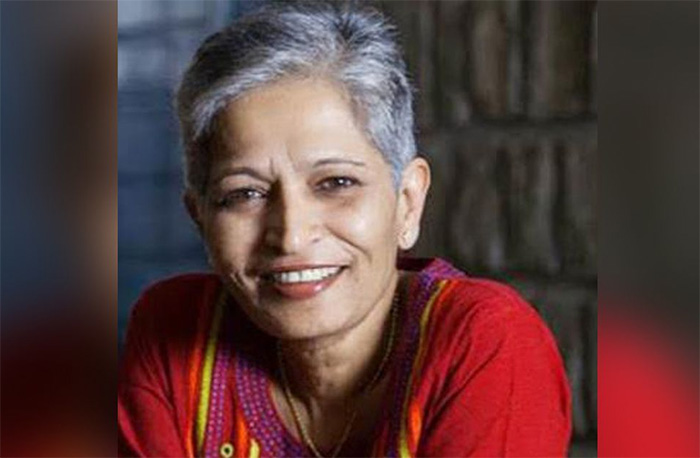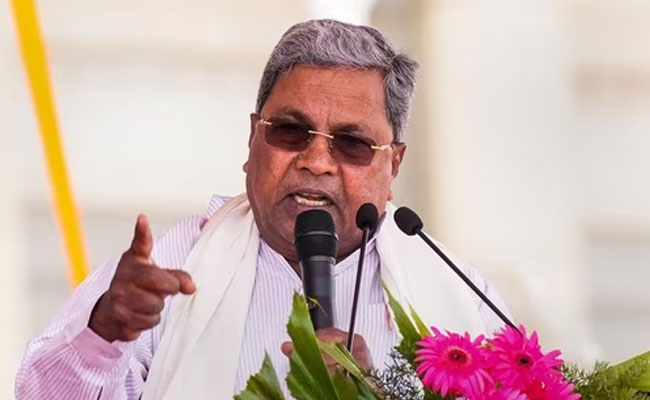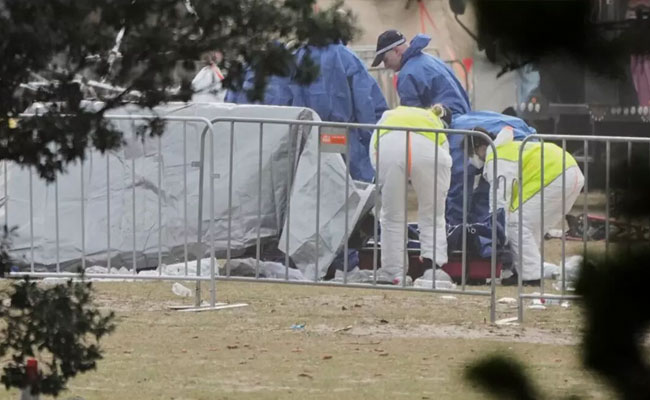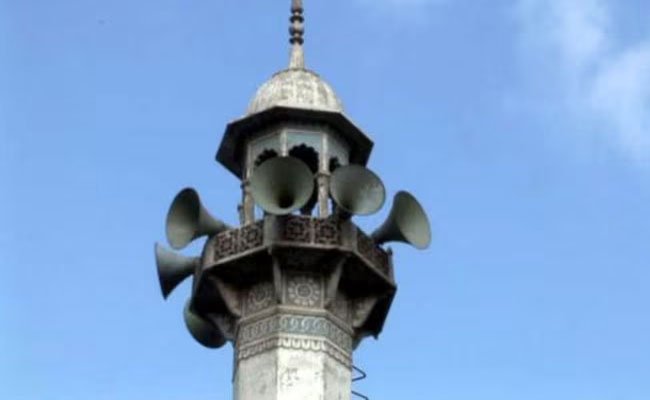New Delhi, Sep 21: The Supreme Court Tuesday "tentatively" indicated that it is inclined to set aside a part of the high court order quashing the charge sheet against an accused, allegedly involved in the murder of journalist Gauri Lankesh, for the purported offences under the provisions of the Karnataka Control of Organised Crimes Act (KCOCA).
A bench headed by Justice A M Khanwilkar told the lawyer appearing for the accused that what has been given to him is "bonus" as the Karnataka High Court has also quashed the charge sheet against him for the alleged offences under the KCOCA.
The apex court observed this while hearing the pleas including the one filed by Kavitha Lankesh, sister of the slain journalist, challenging the April 22 this year order of the high court quashing the August 14, 2018 order of the police authority granting approval to invoke the provision of KCOCA for investigation against Mohan Nayak.
Lankesh was shot dead on the night of September 5, 2017, from a close range near her house in Rajarajeshwari Nagar in Bengaluru.
"We are tentatively indicating to you that we are inclined to quash the last part of the order. On prior approval, even if we uphold the finding given by the high court, the fact remains that nothing prevents the investigating agency to investigate on the factum of whether you are member of that syndicate or not and to present charge sheet after collating the material in that regard," the bench, also comprising justices Dinesh Maheshwari and C T Ravikumar, told the counsel appearing for Nayak.
"So far as you are concerned, what has been given to you is bonus. The charge sheet has also been quashed," observed the bench, which reserved its order on the petitions.
The top court also questioned the counsel appearing for the state as to how approval for invoking KCOCA was granted by the authority without there being any prior offence registered against the accused and how could he be levelled as a member of the organised crime syndicate.
The state's counsel said the preliminary charge sheet was filed under the provisions of the Indian Penal Code and the Arms Act and thereafter, during investigation the role of accused came to notice of the investigation officer after which the approval was sought.
"This charge sheet material comes after investigation. At that stage, without there being any offence registered against this particular person how can you level him as member of the organised crime syndicate unless there is some material which was placed before the authority to give prior approval," the bench observed.
It said to be a member of the organised crime syndicate, a person has to be part of the continuing unlawful activity of the syndicate.
During the arguments, the counsel appearing for the accused said if the arguments of the prosecution is to be accepted then anyone can be said to be member of the syndicate
When the counsel termed the law "draconian", the bench said, "Once the validity of the Act has been upheld, how can you say draconian?".
"These laws have their own purpose," the bench said.
The lawyer said the law has been misused and that is why they have approached the court.
The bench said on the aspect of prior approval, the counsel for the accused may be right but to say that no offence has been registered in the past, so he cannot be proceeded at all, is not correct.
The counsel appearing for Kavitha Lankesh argued that high court has erred in coming to the conclusion that KCOCA was not applicable against the accused.
He referred to the role of the accused, as noted in the high court order, and said it is alleged that he had taken a house on rent in the guise of running acupressure clinic but it was meant to accommodate the members of the syndicate.
The bench, after hearing the submissions, asked the parties to file their written submissions within a week.
In its order, the high court had said, "If the approval order itself is bad in law, the sanction order, the charge sheet and the approval order so far as the offences under the Act (KCOCA) against the petitioner (Nayak) have no legs to stand."
Let the Truth be known. If you read VB and like VB, please be a VB Supporter and Help us deliver the Truth to one and all.
Bengaluru (PTI): Karnataka Chief Minister Siddaramaiah on Tuesday said that the union government led by Prime Minister Narendra Modi, attempting to change the name and structure of the MGNREGA, has itself exposed its "hatred" towards the poor and towards Mahatma Gandhi.
He also accused the Centre of "altering" the very structure of the scheme, by shifting nearly 40 per cent of the cost onto the state governments, and called Modi "anti federal".
Suggesting that the NDA government at the Centre start a "Ministry of Name Change", with the Prime Minister himself holding that portfolio, the CM warned of a statewide agitation against this name change move.
The Viksit Bharat Guarantee for Rozgar and Ajeevika Mission (Gramin) (VB-G RAM G) Bill, 2025, that seeks to replace the existing rural employment law MGNREGA, was introduced in the Lok Sabha on Tuesday amid strong objections by the opposition to the "removal" of Mahatma Gandhi's name from it.
ALSO READ: Slain Australia beach shooting suspect native of Hyderabad: T'gana police
"The Union government led by Prime Minister Narendra Modi, which is attempting to change the name and structure of the Mahatma Gandhi National Rural Employment Guarantee Scheme (MGNREGA), has itself exposed its hatred towards the poor and towards Mahatma Gandhi," Siddaramaiah said in a statement.
Implemented by the UPA government 20 years ago, the MGNREGA scheme has played a crucial role in eradicating unemployment and poverty in rural areas, he said, adding that "this scheme, which guarantees the right to employment to every individual, has received praise from economists both in India and abroad."
Noting that MGNREGA was a genuine form of employment guarantee, the CM said the proposed new structure under the Modi government strips away that guarantee and places the assurance of work at the whims of political leaders.
"This will further deepen caste discrimination and social inequality," he claimed.
Highlighting that the NDA government has altered the very structure of MGNREGA, a scheme whose entire expenditure was earlier borne by the Central government, by shifting nearly 40 per cent of the cost onto the state governments, Siddaramaiah said this stands as clear evidence of the "anti-federal attitude" that Prime Minister Modi has followed ever since coming to power.
"This move will also increase the migration of poor people in search of work as the proposed form does not guarantee employment in their own location -- forcing families to travel long distances to survive," he said.
Naming this scheme after Mahatma Gandhi, who sowed the dream of Gram Swaraj, was a meaningful decision, the CM said, "While Prime Minister Narendra Modi indulges in praising Gandhi during his foreign tours, within the country he has consistently engaged in attempts to erase Gandhi's legacy from key national programmes. From a parivar that seeks to glorify Gandhi's assassin Godse, what different conduct can one really expect?"
"Narendra Modi is widely known for simply changing the names of landmark schemes launched by the UPA government rather than preserving or strengthening them. It would be more appropriate for this government to start a 'Ministry of Name Change,' with the Prime Minister himself holding that portfolio," he said.
More than 25 flagship programmes launched during earlier governments were merely renamed or repackaged by the present regime, the CM further said, listing out that the Nirmal Bharat Abhiyan was rechristened as the Swachh Bharat Mission, while the Basic Savings Bank Deposit Account scheme was rebranded as the Pradhan Mantri Jan Dhan Yojana, among others.
"These changes reflect a consistent pattern of altering names rather than fundamentally strengthening or expanding the original intent of these welfare initiatives," he added.
Stating that the Congress party and state government strongly condemn this "anti-people" decision of the Narendra Modi government, which has snatched food from the plates of the poor, insulted Bapu, and attempted to strangle state governments financially, Siddaramaiah warned about launching a statewide agitation against this move.
"The responsibility of preserving the MGNREGA scheme in its original form must also be taken up by the lakhs of beneficiaries of the scheme. They must hold the BJP leaders of the state accountable and exert pressure on them to raise their voices against this injustice, rising above party lines," he said.





